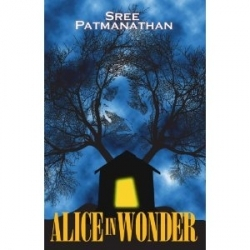It looks like you've stumbled upon a page meant to be read by our code instead of viewed directly. You're probably looking for this page.
Alice in Wonder
Alice Lancaster, a wealthy, Caucasian international relations worker, lives with her family in Kuala Lampur, Malaysia. After an unsettling encounter with a Chinese mystic, she finds her paradigms shifting; she sees the world in a new metaphysical way. Desperate and confused, she travels to Mumbai, India, for unclear reasons, where she gets kidnapped by an Indian thug. More existential philosophizing ensues during her captivity and after her rescue. Eventually, her husband Bruce is pulled into her crisis of conscience.
Alice in Wonder, Sree Patmanathan’s first novel, has the potential to be an interesting look at the class differences between affluent American expatriates and the countries in which they stay. It also could tell a compelling tale of a woman having a breakdown and reevaluating her priorities. While the seeds exist for both these narratives, unfortunately, neither seed grows to fruition. The novel adds up to nothing more than a platform for the author’s views on the nature of reality. Patmanathan’s point may have been to get his readers to discover the wonder of the universe as Alice supposedly does, but neither readers nor protagonist achieve this goal amidst the thicket of words and higher concepts.
None of the characters possess unique personalities. Rather, they all serve as mouthpieces for the author’s long discourses on the nature of being. Readers do not know much about what Alice was like prior to her crisis, but Patmanathan implies that she is not a deep thinker by nature. Immediately after her encounter with the Chinese mystic, however, she waxes existential. In fact, all of the characters pontificate about philosophical matters, making the text tiresome for readers. It is difficult to care about these undifferentiated, flat people, and their lengthy metaphysical musings bog down any forward motion of the ostensible plot.
Patmanathan further undercuts himself by informing readers, in the middle of the manuscript, that it is unnecessary for them to read the final chapter of his book. This surprising statement casts doubt on his credibility and questions the importance of the whole novel. Unnatural phrasing plagues Alice, adding to readers’ bewilderment. Take, for example, this sex scene:
As he scuffled under the sheets—with the moving finger! In moments it was a waning incandescence rekindled; and in a twinkle the covers were strewn, the lights were out and her nightgown had strangely dislodged itself. There was no room for small talk after that, no room for literature either; as her mouth had rummaged menacingly under the covers.
All thoughts are italicized and placed in quotation marks; chunks of dialogue are also italicized and in quotation marks, which sometimes makes it impossible to tell if someone is speaking or thinking. Capitalization inconsistencies abound. Nouns are capitalized one minute, only to be printed in lowercase when they next appear. Commas are absent or misused.
Ultimately, Alice in Wonder will leave readers in a state of befuddled wonderment. Patmanathan’s muddled rabbit hole is not recommended.
Reviewed by
Jill Allen
Disclosure: This article is not an endorsement, but a review. The publisher of this book provided free copies of the book and paid a small fee to have their book reviewed by a professional reviewer. Foreword Reviews and Clarion Reviews make no guarantee that the publisher will receive a positive review. Foreword Magazine, Inc. is disclosing this in accordance with the Federal Trade Commission’s 16 CFR, Part 255.
